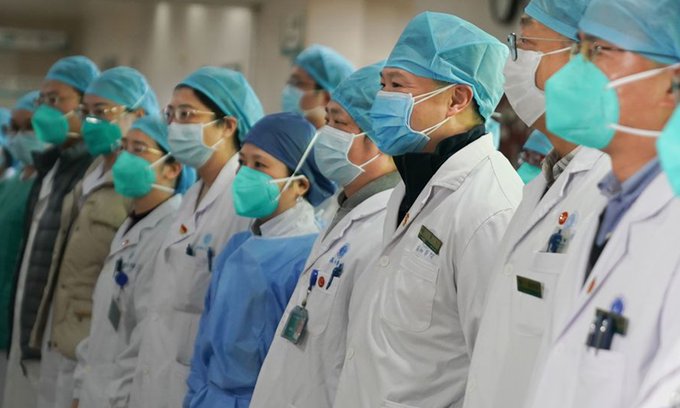Doctors say nearly everyone who recovers from coronavirus develops antibodies within weeks.
This gives hope that antibody tests – a simple finger-prick blood test – will be effective in showing whether someone has had the bug and has developed some potential protection against reinfection.
Advertisement
The Sun reports that testing giant Roche Diagnostics is hoping to roll out 100 per cent accurate antibody tests in two weeks across the UK.
Scientists from China made the revelation after analysing the blood of the 258 patients for signs of the immune cells.
The human body makes two types of antibodies to fight infections: immunoglobulin M (IgM) and immunoglobulin G (IgG).
IgM antibodies are produced early on after infection and they provide a short burst of protection before fading away.
Advertisement
On the other hand, IgG antibodies take longer to develop, but are the type with the potential for more long term protection.
And the scientists found that 95 per cent of the patients they examined developed both types of the immune cells that fight the virus.
In particular, only about 40 per cent of the patients had developed IgM antibodies within the first week after infection.
However, by the time the patients had been under observation for two weeks, 95 percent of them developed detectable levels of IgM.
More importantly, they all produced IgG antibodies.
Advertisement
In a follow-up study, the scientists analysed blood from another 69 patients.
And after 20 days, all but two patients – who were related, a mother and daughter – produced antibodies.
The scientists pointed out that these results are an encouraging sign that the human body can learn to defend itself against coronavirus after exposure.
Dr Francis Collins, wrote on the National Institutes of Health’s (NIH) Director’s blog on Thursday that the recent study “brings much-needed clarity, along with renewed enthusiasm, to efforts to develop and implement widescale antibody testing for SARS-CoV-2.”
It comes as many questions still remain around antibodies: whether everyone develops them, what level of antibodies is necessary to confer protection, and how long that protection lasts.
Despite this, Dr Collins pointed out that researchers will need to carry out more tests on antibodies to see just how much protection and for how long these antibodies confer immunity.
Advertisement
If it is proven that most people develop protection against reinfection this means we may collectively develop some herd immunity that would keep possible future resurgences of coronavirus infections from reaching epidemic levels.
Dr Collins added: “There’s still a way to go with both virus and antibody testing for Covid-19.
“But as this study and others begin to piece together the complex puzzle of antibody-mediated immunity, it will be possible to learn more about the human body’s response to SARS-CoV-2 and home in on our goal of achieving safe, effective, and sustained protection against this devastating disease.”
When a person gets coronavirus, the body starts making specially designed proteins called antibodies in response – as a way to fight the infection.
After they recover, those antibodies float in the blood for months, maybe even years.
That’s the body’s way of defending itself in case it becomes infected with the virus again.
So an antibody test specifically looks for antibodies which will be able to tell whether you’ve already been exposed to Covid-19.
Anyone who has already had the illness is presumed to be immune to getting it again – at least, in the intermediate term.
This would allow them to go back to work safe in the knowledge that they are unlikely to become infected again or pass the virus on.
The check that has been developed for Covid-19 is a finger-prick blood test, with the samples sent to laboratories and results available within a few days.
Dr Hilary Jones, a GP and resident doctor on Good Morning Britain, explained that it works “almost like a pregnancy test, except you need a drop of blood”.
These tests are being developed by several different firms and Public Health England (PHE) is also working on its own test.
They still need to be validated to ensure they give accurate results.
When a person gets coronavirus, the body starts making specially designed proteins called antibodies in response – as a way to fight the infection.
After they recover, those antibodies float in the blood for months, maybe even years.
That’s the body’s way of defending itself in case it becomes infected with the virus again.
So an antibody test specifically looks for antibodies which will be able to tell whether you’ve already been exposed to Covid-19.
Anyone who has already had the illness is presumed to be immune to getting it again – at least, in the intermediate term.
This would allow them to go back to work safe in the knowledge that they are unlikely to become infected again or pass the virus on.
The check that has been developed for Covid-19 is a finger-prick blood test, with the samples sent to laboratories and results available within a few days.
Dr Hilary Jones, a GP and resident doctor on Good Morning Britain, explained that it works “almost like a pregnancy test, except you need a drop of blood”.
Earlier this month it was revealed that Roche Diagnostics has finally created a kit accurate enough to be used at scale – and the firm says it has enough to provide the NHS with hundreds of thousands every week.
Recent efforts to produce antibody tests have been plagued by inaccurate results, with the Government allegedly spending £16million on two million kits from China that didn’t work.



